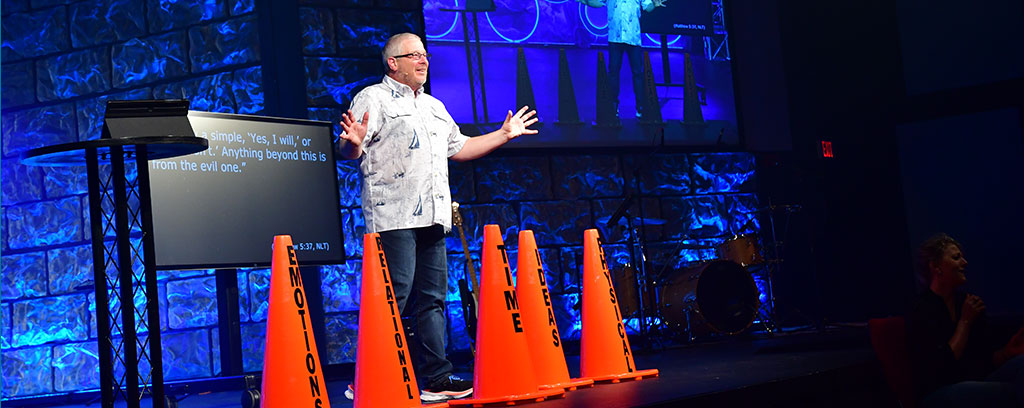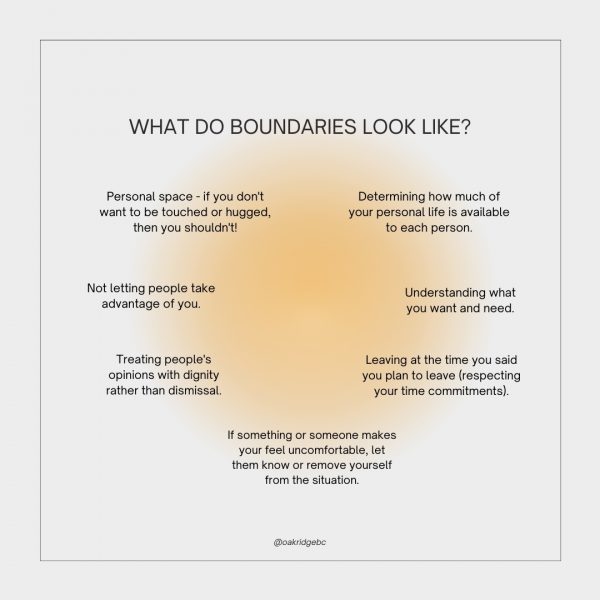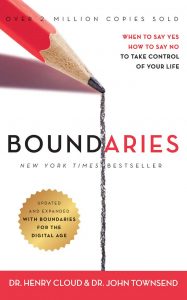
Setting healthy boundaries is an integral part of establishing your identity and is vital for your mental health and wellbeing.
The Mossolonian definition of boundaries is, “A chosen set of behaviors that I will and will not accept from others.”
Jesus dealt with boundary intruders all the time. People always had an idea about what Jesus should be doing, what He should be saying, and where He should be going. It was a constant issue in His life.
This is what Jesus had to say about “Boundary Intruders”…
“They load you with impossible demands that they themselves don’t even try to keep.” (Matthew 23:4, The Living Bible)
That’s what Boundary Intruders do. They violate the healthy boundaries from you that they would never tolerate you doing to them.
How can you tell when Boundary Intruders have invaded your space? Let me mention four signs:
DISCOMFORT: You feel stressed, anxious, fearful, and maybe a little guilty when you are around this person.
DISADVANTAGED: You feel taken advantage of, underappreciated, and manipulated in the relationship. You find that you are constantly doing what you don’t want to do.
DISEMPOWERED: You feel unable to say no without suffering the consequences. It’s a non-reciprocal relationship.
DISPROPORTIONATE: You feel enslaved to their happiness. The relationship is one-sided. You are made to feel that they are superior and you are inferior.
These Boundary Intruders are #crazymakers!! They have learned to get their way by violating boundaries. They will never stop on their own.
You will have to learn the fine art of setting healthy boundaries. Until then, those #crazymakers will keep violating your boundaries.

Here are 5 ways to set healthy boundaries.
1. Believe that you DESERVE them.
You have got to believe that you deserve to have some boundaries in your life. Boundary Intruders can spot an easy mark. They can tell when someone can be used and abused and taken advantage of.
What makes an easy mark for a Boundary Intruder? A person who does not love themselves. You must LOVE YOURSELF enough to set and enforce healthy boundaries.
What?? You may be thinking, “I thought self-love was egotistical, arrogant, or proud???”
Actually, Jesus taught us in the Great Commandment that it’s impossible to love others when you don’t love yourself.
“A second [commandment] is equally important: ‘Love your neighbor as yourself.'” (Matthew 22:39, NLT)
God doesn’t want us to live in these kinds of disadvantaged, disempowered, and disproportionate relationships. That’s not God’s design.
Question: If you treated other people the way you treat yourself, would they be more likely to LOVE YOU or LOSE YOU? Paul said:
“Christ has set us free! This means we are really free. Now hold on to your freedom and don’t ever become slaves…” (Galatians 5:1, CEV)
What are some signs that you do not love yourself properly? You say things like:
- ”I need to be in a relationship.”
- “At least this relationship isn’t as bad as the last one.”
- “They would be lost without me.”
- “It just needs a little more time.”
- “They’re not always this way.”
What’s the commonality? They are all just EXCUSES for not loving yourself.
SAD TRUTH: The biggest boundary violator is not others; it’s yourself.
“Be on guard. Stand firm in the faith. Be courageous. Be strong. And do everything with love.” (1 Corinthians16:13 – 14, NLT)
Learn how to be assertive without being aggressive. It starts with believing that you deserve boundaries.
2. Learn to love without RESCUING.
You have to learn how to love people without rescuing them. If you are bent towards MERCY and COMPASSION, your first response is always to rescue — creating a codependent relationship. You have to let people pay for the consequences of their own choices or else you’ll be rescuing them over and over again.
“Hot-tempered people must pay the penalty. If you rescue them once, you will have to do it again.” (Proverbs 19:19, NLT)
Recipe for creating a CODEPENDENT:
- Do whatever is necessary to avoid any conflict.
- Provide assistance when they make poor choices.
- Act as though this is just a “one-up.”
- Feel responsible for their wellbeing.
- Make excuses for their behavior/choices.
- Put their needs ahead of yours.
“For we are each responsible for our own conduct.” (Galatians 6:5, NLT)
Creating boundaries for people is a healthy way of helping them to grow and mature. It’s what every good parent knows to be true.
“Discipline your children while there is hope. Otherwise you will ruin their lives.” (Proverbs 19:18, NLT)
PARENTS: If you constantly rescue your children from the consequences of their choices, you will be doing it for the rest of your life!
REMEMBER: There’s never a time when you will stop being their parent, BUT there should be a time when you stop PARENTING.
3. Care enough to CONFRONT boundary invasions.
“Speak the truth in love, growing in every way more and more like Christ…” (Ephesians 4:15, NLT)
There is no GROWTH without TRUTH.
You can’t grow unless you have people in your life that love you enough to tell you the truth.
PROBLEM: Everyone is in a COWARDICE COLD WAR.
We are all a bunch of cowards. We don’t want to tell the truth or have a difficult conversation because it’s uncomfortable, and we don’t want to rock the boat.
Pastor Bryan mentioned in his message on conflict resolution that we often either BOTTLE UP or BLOW UP. I’m going to add one more option – we also often COVER UP. We lie to them and ourselves when we fail to CONFRONT.
“Stop lying to each other; tell the truth, for we are parts of each other and when we lie to each other we are hurting ourselves.” (Ephesians 4:25, The Living Bible)
We must courageously confront Boundary Intruders if there is ever going to be a change.
Pointers for a Crucial Conversation
- Stick to the facts
- Watch your words and body language carefully.
- When people become furious, become curious.
- Seek clarity more than resolution
- Look for ways you can change yourself.
4. PROTECT yourself.
“Guard your heart above all else, for it determines the course of your life.” (Proverbs 4:23, NLT)
In Hebrew, the word for heart is לֵב “leb.” This word could also be called your soul, but it’s even deeper than that. It means your thoughts, your emotions, the behavioral choices that you make. Your heart is your LIFE!
The bible says YOU are responsible for guarding your life/heart. Guarding your heart/life means setting and enforcing boundaries.
5 Specific Boundaries to set to protect your heart.
1) Emotional Boundaries
- Who IS and IS NOT allowed access to your feelings.
- Determining HOW MUCH of your personal life is available to someone.
- Taking responsibility for your feelings. For example when I say, “You make me so mad!” What that actually means is, “I’m allowing you control over my emotions.” We are responsible for our feelings.
2) Conversational Boundaries
- Be RESPECTIVE of people’s PERSPECTIVE
- Treat people’s ideas and opinions with DIGNITY rather than DISMISSAL.
3) Physical Boundaries
- Personal space.
- Personal contact (i.e. hug, kiss, touching)
- Recognize that you were raised in a specific set of cultural “norms”
4) Relational Boundaries
- There is an unwritten code of EXPECTATIONS we bring into our relationships.
What I expect FROM you and OF you.
What you expect, want, and “need” from me and vice-versa.
- The keys to relational boundaries are TRUST and COMMUNICATION.
FACT: People will always VIOLATE what I fail to COMMUNICATE!
5) Time Boundaries (#1 boundary that we allow others to violate)
“Walk in wisdom…redeeming the time.” (Colossians 4:5, NKJV)
- TIME is your most LIMITED/VALUABLE asset.
- Using your time should be as critical as how you spend your MONEY.
- You have 168 hours a week. You get to decide how you spend those hours.
Wise people align their convictions with their calendar. When you understand your priorities and values and align your time with your heart and soul, others cannot steal that time from you.
So how do I respond when someone asks me for my time? Jesus made it pretty simple:
“Just say a simple, ‘Yes, I will,’ or ‘No, I won’t.’ Anything beyond this is from the evil one.” (Matthew 5:37, NLT)
Why do we struggle with setting time boundaries? Because we tend to be people-pleasers and saying “No” evokes an emotional response — making us uncomfortable. To get healthy we have to become more comfortable saying no.
Saying “No”…
- Says I am in control of my calendar.
- Reveals my true values.
- Shows my clarity of priorities.
- Says I am the only one who will give an account for my life.
- Says I am only responsible for my happiness / mental health.
- Says I realize and accept my limitations.
- Says I care too much about your growth and development to short-circuit it.
- Says I love myself enough not to be used, manipulated, or taken advantage of.
Setting healthy boundaries does NOT convert boundary INTRUDERS into boundary RESPECTERS. You have to protect yourself by establishing clear boundaries over and over.
5. RINSE and REPEAT.
You have to rinse and repeat. And then rinse and repeat again and again. Why? Because boundary intruders have learned that they can get their way through manipulation. You will have to set healthy boundaries, and then you will have to say, I WILL NOT GIVE UP!!
“And let us not get tired of doing what is right, for after a while we will reap a harvest of blessing if we don’t get discouraged and give up.” (Galatians 6:9, The Living Bible)
🎧 Listen to the full sermon “Setting Boundaries” May 2, 2021


David Talley
Posted at 13:34h, 13 MayWe say, “They’re not always this way.”
Great point!